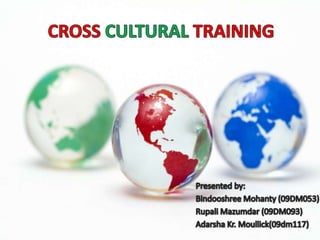Report
Share

Recommended
Recommended
More Related Content
What's hot
What's hot (20)
Concept and role of culture in International human resource management

Concept and role of culture in International human resource management
Staffing recruitment and selection of INTERNATIONAL HUMAN RESOURCES MANAGEMENT

Staffing recruitment and selection of INTERNATIONAL HUMAN RESOURCES MANAGEMENT
Learning Process, Training Climate, Development and Designing Training Modules

Learning Process, Training Climate, Development and Designing Training Modules
Training Methods, Techniques & Pedagogy, Training aids & Tools, Facilities fo...

Training Methods, Techniques & Pedagogy, Training aids & Tools, Facilities fo...
Viewers also liked
Viewers also liked (11)
Cross Cultural Training For EFL Teachers Working In South Korea

Cross Cultural Training For EFL Teachers Working In South Korea
Cross cultural training
- 1. CROSS CULTURAL TRAINING Presented by: BindooshreeMohanty (09DM053) RupaliMazumdar (09DM093) Adarsha Kr. Moullick(09dm117)
- 2. Understanding the differences in culture. Cross Cultural teams or business interactions. Interpersonal relationship. CCT helps to impress business colleagues.
- 3. PHASES OF CULTURAL SHOCKS
- 4. GRAPH
- 5. Ways To Overcome The Cultural Shock Understand the new country before departure. Learn the language. Accept the cultural Differences. Accept the subculture. Be tolerant and open minded.
- 6. Prior knowledge about host country Employees sent without prior CCT confidence and positive attitude Idea about host country Experience sharing Information through social network
- 7. Why Companies should include families for the CCT program ?
- 8. Family concerns- 92 % Spouse/partner- 61 % Career aspirations- 44 % Compensation- 43 % Job security- 30 % Location quality of life- 19 % Personal safety- 8 % Inadequate practical support- 3% Source: Global Relocation Trend Survey-2009 Reasons for Assignment Refusal
- 9. Reasons for Early Return Family concerns- 27 % Accept a new position in company- 24% Complete assignment early- 15 % Career concerns- 7% Security concerns- 1% Other- 20 % Source: Global Relocation Survey,2009
- 10. Components Of Cross Cultural TrainingMODEL FOR CROSS CULTURAL TRAINING Language Training Cultural Awareness Training (Area Studies) Managing Change/Transition Stress Management Dining & Meeting Etiquette Practical Assistances
- 11. A case study on International Air Transport Association (IATA) Its corporate thinking has traditionally been biased towards western ideas and practices. Classic approaches: 1. extensive use of expatriates (the colonial approach) 2. bi-cultural intermediaries New approach : Intercultural Leadership Engagement and Development (I-Lead) program
- 12. THANK YOU
